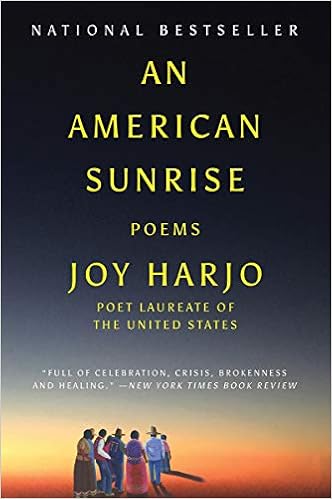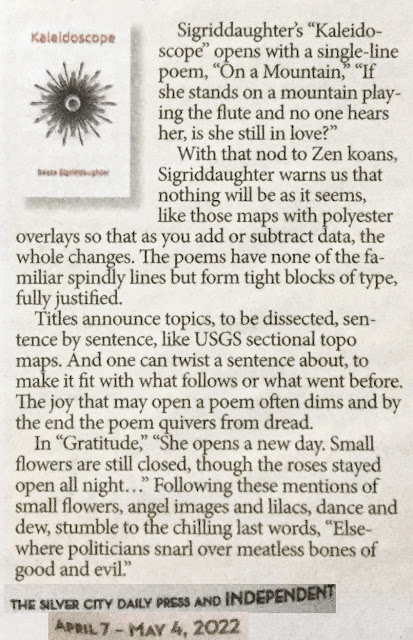
Crazy Brave by Joy Harjo (memoir, 2012) and
An America Sunrise by Joy Harjo (poetry, 2019)
Review by Greg Gilbert
Joy Harjo is our incumbent United States Poet Laureate, the first Native American to hold that honor. I use the plural first person, our, for two reasons. One is that America’s Poet Laureate is appointed by the Librarian of Congress of our United States, and two, in recognition of Harjo’s use of the plural first person we throughout her prose and poetry to denote community. Joy Harjo’s community is not an all-encompassing generic Native American stereotype but a multiplicity of tribes and ancestors, their songs, their connections to the earth, and their generational responses to being forcibly and violently removed from the lands in which they grew their cultures. “Within a few generations we had gone from being nearly one hundred percent of the population of this continent to less than one-half of one percent. We were all haunted” (Brave page 100).
Within both works, Harjo
contemporizes how denied avenues of expression and purpose can result in
self-destructive behaviors, alcoholism, drugs, and domestic violence. In Crazy
Brave, Harjo alludes to the all-too-common story of men who seek fulfillment
through sexual liaisons outside of marriage, who seek release through alcoholism
and domestic violence; and she explores the longing for family, the larger we,
and love that leads women to cleave to such men, even to their mutual devastation.
To read Harjo’s poetry and prose without appreciating the range of nobility and
loss her work describes is to miss the point of why she deserves to be our
Poet Laureate.
A personal delight that I take
from her words concerns their reverence for a luminous realm experienced by the
very young, the very old, and most of us in instants of revelation. If there is
a common theme among most native tribes, it is a celebration and respect for
the spiritual realm and its place in the natural world, and this is why the
first-person plural is vital. The we of Harjo’s tribes and the we
of Harjo’s America are an entwined WE the people of this earth and our shared
duty to its preservation and to one another. Harjo reminds us that we must
quiet ourselves and open to the silence that gives us life, what she refers to
as “The Knowing.”
The earth is leaning sideways
And a song is emerging from the floods
And fires. Urgent tendrils lift toward the sun.
You must be friends with silence to hear.
The songs of the guardians of silence are the most powerful—
They are the most rare. (from “Singing Everything,” Sunrise page
48)
Likewise, in Crazy Brave,
Harjo writes that “because music is a language that lives in the spiritual
realms, we can hear it, we can notate it and create it, but we cannot hold it
in our hands” (Brave page 8). To her credit, Harjo, at age 40, took up
the instrument that she was denied as a child because of her gender, the
saxophone by which she can give expression to her love of the blues. Harjo is a
21st Century woman with deep roots of loss and longing. Among her
early memories is her love of “radio, jukeboxes, or any magic thing containing
music” (Brave page 7). She writes of hearing Miles Davis before she knew
the words jazz or trumpet. She heard the stomp dance music, heard the workers
singing in the fields, and she heard her mother singing in the house. “It is
her song that lit my attention as I listened in the ancestor realm” (Brave
page 8). In her poem, “Becoming Seventy,” Harjo speaks of “Becoming old
children born to children born to sing us into / Love.” She tells us to “Sing
the blues to the future of everything that might happen and will. All the
losses come tumbling” (Sunrise pages 83-4). And on page 88, she writes
of slavery and offers this poignant observation, “Only war ships. For freedom,
freedom, oh freedom sang the slaves, the oar rhythm of the blues lifting up the
spirits of our peoples whose bodies were worn out, or destroyed by a man’s
slash.”
And most wonderfully, she asks,
“Who sings to the plants / That are grown for our plates? / Are they gathered
lovingly In aprons or arms?” (Sunrise page 93). We are reminded by her
of our alienation from the very sources of life and, thus, from ourselves.
Throughout her works, Harjo searches out justice for the ancestors, for
the earth, and all of its peoples. She sees the folly of our coming and
goings while herself on a journey that she translates through her poetry. She
reminds us not to forget our roots. In a powerful prose poem, she washes
her mother’s body.
I felt sadness as grief in her
lungs. The grief came from the tears of thousands of our tribe when we were
uprooted and forced to walk the long miles west to Indian Territory. They were
the tears of the dead and the tears of those who remained to bury the dead. We
had to keep walking. We were still walking, trying to make it through to home.
The tears spoiled in her lungs, became
tuberculosis.
She exists in me now, just as I will and already do within my grandchildren. No
one ever truly dies. (Brave page 93)
As for our human endeavors, “Nobody goes anywhere though we are always leaving and returning. It’s a ceremony. Sunrise occurs everywhere, in lizard time, human time, or a fern uncurling time” (Sunrise page 86). Throughout her writings, Joy Harjo joins her present generation, our generation, as the door to memory. “The knowing always spoke softly, wisely” (Brave page 49), and so do the words of our Poet Laureate.





